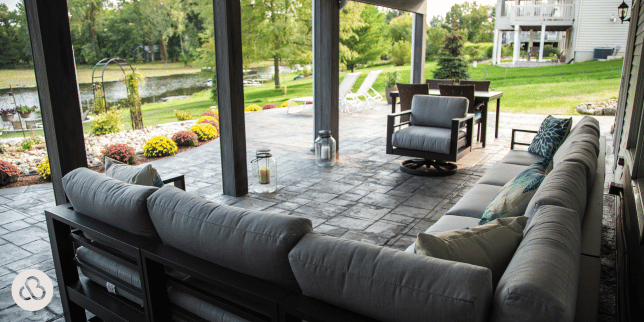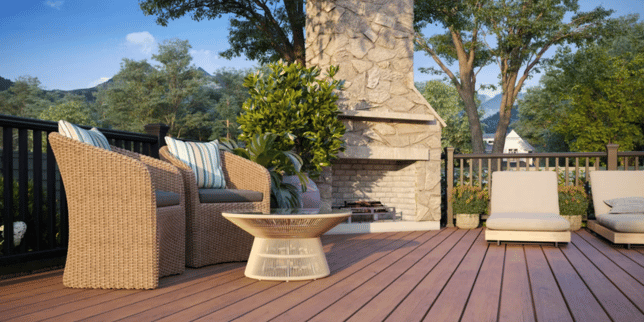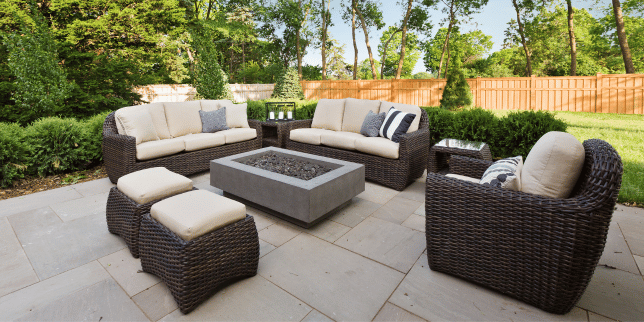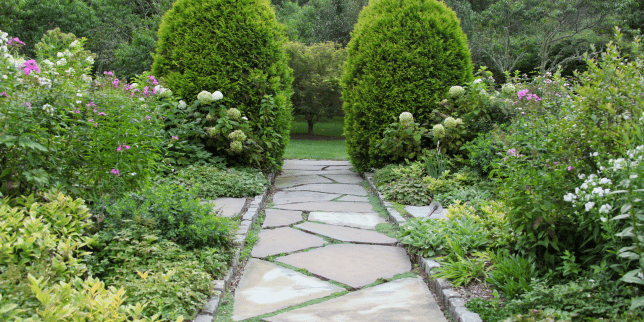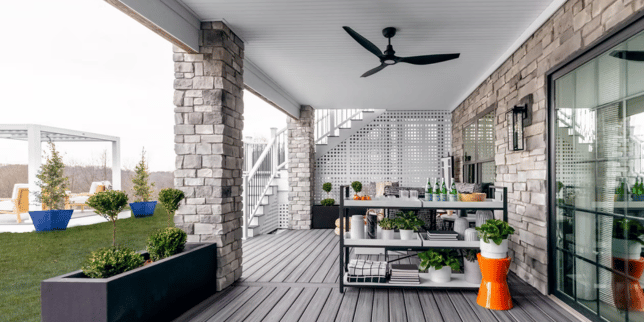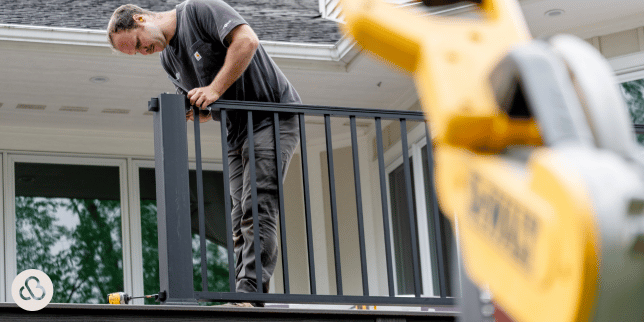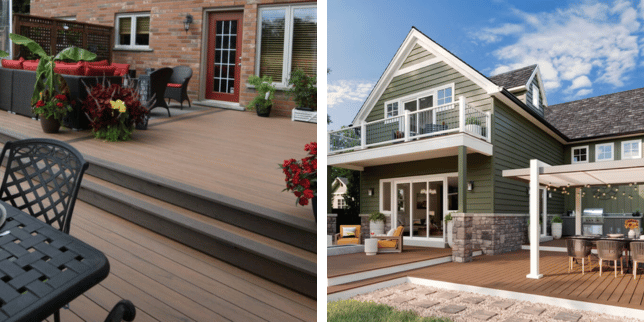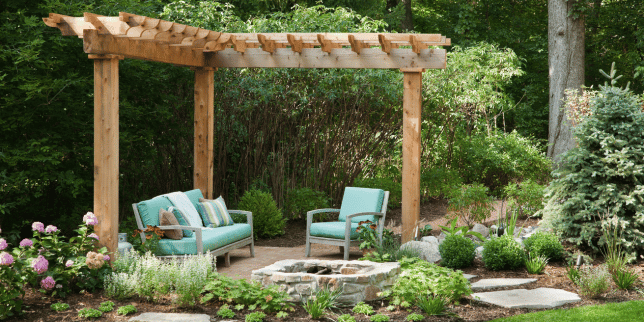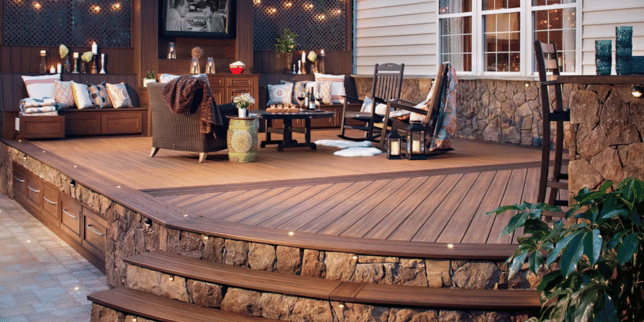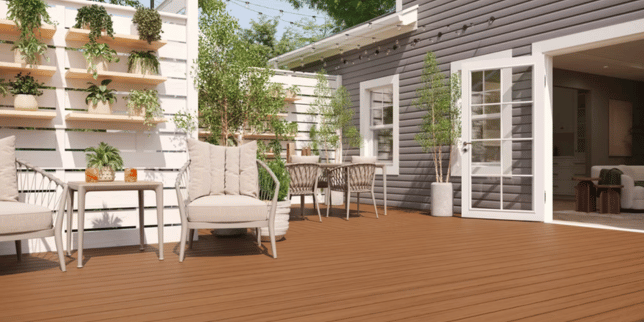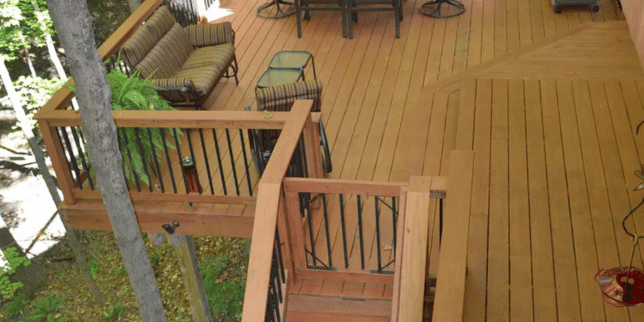Are Composite Decks Hot to Walk On? Everything You Need to Know
August 8th, 2025
4 min read
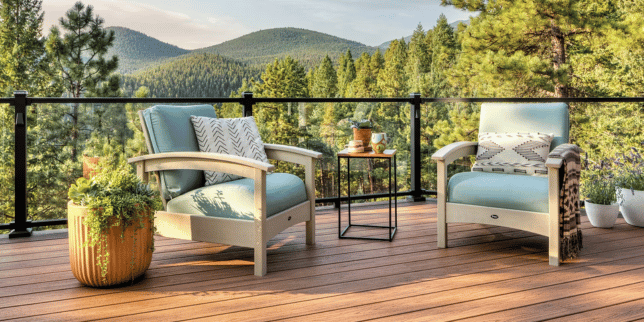
If you’ve ever stepped outside barefoot onto a deck in the middle of summer, you know the pain of a scorching surface. For families considering composite decking in Michigan, heat retention is a common concern, especially if you have young kids, pets, or anyone who loves to lounge barefoot. So, how hot does composite decking actually get?
At Custom Built Design & Remodeling, we help Mid-Michigan and Northern Michigan homeowners design comfortable, long-lasting decks tailored to their needs. We've built hundreds of Trex and composite decks across the state and understand how sun exposure, material type, and deck orientation all affect surface temperature.
In this article, we’ll walk you through what really makes a deck feel hot, including real temperature comparisons, design tips to reduce heat, and how to decide if composite is right for your space:
Header PC: Trex
Let’s Be Honest: Everything Gets Hot in the Sun
PC: Trex
If your deck is south-facing (aka in direct sunlight) in July, yes, composite materials will heat up. But so will nearly everything else.
Wood. Concrete pavers. PVC. Even a natural stone patio. Try walking barefoot across any of them in peak afternoon sun, and you’ll feel it.
Some people are conditioned to think composite is especially hot, but that’s largely a misnomer. It’s not significantly hotter than other outdoor materials in the same conditions.
In fact, in multiple side-by-side tests (and over 30 YouTube videos), composite performs about the same, especially when comparing similar colors.
Color Matters More Than Material
PC: Trex
If barefoot comfort is a priority, the color you choose will make the biggest difference. Just like a black T-shirt on a sunny day, darker deck colors like Trex Lava Rock or Spiced Rum will absorb more heat. Lighter colors, like Trex Foggy Wharf or Island Mist, will reflect more sun and feel cooler to the touch.
Want to prove it for yourself? Put sample boards outside for a day in direct sunlight. Touch them at 1 p.m., 5 p.m., and 8 p.m. You’ll notice the lighter ones stay significantly cooler.
Deck Orientation, Shade, and Reflection All Matter
PC: Trex
Where and how your deck is built plays a big role in how hot it gets, sometimes just as much as the decking material itself.
1. Deck Orientation
Deck orientation affects sun exposure. A deck that faces south or southwest is going to take on more intense afternoon sun than one facing north or east. Over time, that longer exposure raises the deck’s overall temperature.
2. Natural Shading
Natural shading from nearby trees, a roof overhang, or even a second-story deck above can significantly lower surface temperatures by blocking direct sun. If your deck sits in partial shade most of the day, you’ll likely notice a big difference in comfort.
3. Reflection
Reflected heat from nearby surfaces, especially windows, can create surprising hot spots. We've seen cases where south-facing glass doors acted like magnifying glasses, focusing heat on one specific section of the deck and making it noticeably hotter than the rest.
Composite vs. Other Materials: Heat Retention Breakdown
PC: Trex
It’s true: composite decking can get hot in the sun, but so can any outdoor surface. Whether it’s wood, concrete, pavers, or composite, direct sunlight will raise the surface temperature. The difference lies in how much heat each material retains.
In a series of real-world heat comparison tests by Custom Deck Creations, various decking materials were left in full sun and measured for temperature. Composite decking was consistently warmer than wood or light-colored stone pavers, with darker boards absorbing the most heat.
Here’s what they found:
Test #1: 80°F Outdoor Temperature (Deck Boards in Grass)
Trex Composite Boards
- Rocky Harbor (light brown): 93°F
- Toasted Sand (medium brown): 98°F
- Vintage Lantern (dark brown): 101°F
- Coastal Bluff (dark brown): 96°F
- Island Mist (medium gray): 95°F
- Pebble Grey (medium gray): 95°F
Pressure-Treated Lumber
- Unstained: 81°F
- Dark Stain: 91°F
Note: These boards were placed directly on cool grass, so they may have read slightly cooler than if installed on an actual deck surface.
Test #2: 86°F Outdoor Temperature
- Composite Deck Board (light brown): 111°F
- Painted Wood (similar color): 108°F
Test #3: 86°F Full Sun Exposure All Day
Trex Composite Colors
- Tiki Torch: 135°F
- Havana Gold: 137°F
- Island Mist: 135°F
- Spiced Rum: 148°F
- Lava Rock: 147°F
Other Materials
- Stained IPE Hardwood: 136°F - 137°F
- Stained Treated Yellow Pine: 119°F - 133°F
- Flagstone Pavers: 119°F - 126°F
Test #4: Patio Pavers in 90°F Weather
- Concrete: 119°F
- Flagstone: 112°F
- Travertine: 108°F
- Shell Stone: 94°F
Key Takeaway: Darker composite boards, particularly deep browns and reds like Trex Spiced Rum or Lava Rock, get the hottest, reaching nearly 150°F in full sun. In comparison, light-colored pavers like shell stone maxed out at just 94°F.
Practical Solutions for a Cooler Deck Experience
PC: Trex
No matter what material or color you choose, there are smart ways to keep your deck comfortable on hot days:
- Go Lighter: Lighter decking colors generally stay cooler to the touch, which is great for barefoot use.
- Create Shade: A pergola, shade sail, umbrella, or retractable canopy can block the sun during peak hours.
- Add Soft Surfaces: Outdoor rugs, runners, or mats can break up the surface and give your feet a break in high-traffic areas.
- Ventilate Below: Building your deck higher off the ground with an open structure underneath allows air to flow freely beneath it. This ventilation helps reduce heat buildup on the deck surface, keeping it cooler, especially during hot summer days.
- Test it First: Before committing, place a test board where your future deck will be. Observe how it feels at different times of day to avoid surprises later.
If your family loves spending barefoot afternoons outside, these small considerations can make a major difference in how enjoyable your deck feels, no matter how hot the summer gets.
Next Steps to Building or Remodeling Your Deck
Composite decking can get warm, but that doesn’t mean it’s off the table for barefoot comfort. With smart planning, like choosing lighter colors, adding shade, and understanding your deck’s orientation, you can enjoy a cooler, more comfortable outdoor space.
At Custom Built Design & Remodeling, we help Michigan homeowners design decks that match how their families live, relax, and entertain.
Thinking about a new deck? Schedule a free Discovery Call to start designing a deck that feels just right.
Now that you know more about how hot composite decks get in the sun, let’s explore how much composite decks cost, the top differences between Trex and wood decking, and Trex’s high-quality composite lines:
- How Much Do Composite Decks Cost in Lansing, Michigan? - An overview of how much your Lansing composite deck will cost and the factors that will influence your price.
- Top 10 Differences Between Trex Composite and Wood Decking Material - Learn more about the basic yet essential differences between Trex composite and wood decking when choosing your deck’s materials.
- Comparing Trex Lineage, Transcend, Select, and Enhance Composite Decking Lines - Explore our thorough comparison of Trex’s most common composite decking options, including cost, colors, and benefits.
Michael brings over 2 decades of building and remodeling experience to his position as the Owner and Visionary of Custom Built. Michael’s passion to make an impact on the home building industry has led him to serve for over ten years at the local and state Home Builders Association, culminating as President of the HBA of Michigan in 2020.















